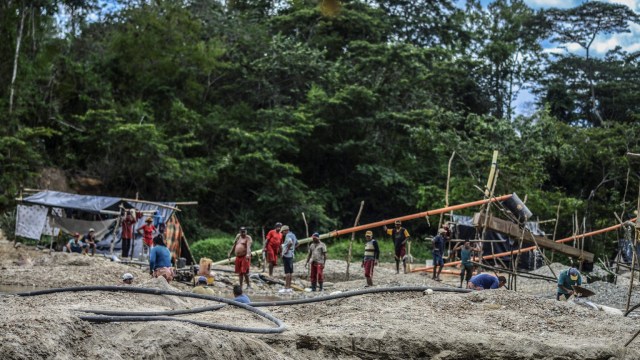
Mining operations in the southern Venezuelan states of Bolívar and Amazonas, with the support of the Nicolás Maduro regime, represent the greatest threat to the human rights, habitat, cultures, and territories of indigenous populations, globalnews agency IPS Noticias reported.
By Diálogo Américas – Julieta Pelcastre
Jul 8, 2022
In these regions of the Amazon, mafias, traders, sindicatos (gangs originally linked to powerful labor unions), traffickers, irregular armed groups, military, indigenous communities, local communities, and members of the regime who control mining activities converge, says the Political Ecology Observatory of Venezuela, an organization that analyzes inequalities and socio-ecological impacts.
“Mining, violence, habitat destruction, death due to diseases, and forced migration create circumstances that the indigenous people are already calling silent genocide,”Aimé Tillet, a researcher who studies indigenous people’s rights at the Central University of Venezuela, told IPS.
In 2021, the extractive policy of the Venezuelan regime represented the main threat to indigenous rights in the country, says nongovernmental organization (NGO) Wataniba, which seeks to strengthen the identity of indigenous peoples in the Venezuelan Amazon.
“Illegal mining is growing at an alarming rate,” María Teresa Quispe, executive director of Wataniba, told Diálogo.
Hellish days
According to the Venezuelan NGO Fundaredes, indigenous populations have had no say in the implementation of mining in their region and are exploited by irregular armed groups with their ongoing extractive practices.
These groups act with the consent of the regime and its military leadership, through a system that guarantees that they will get a high share of the minerals extracted. In exchange, the illegal armed groups receive a portion of the profits, which represents one of their main sources of financing, the report SOS Orinoco 2022 by Venezuelan NGO Social Watch, indicated.
Men and women from indigenous communities work in gold, coltan, and diamond mining. Their work is not voluntary, sometimes they are not paid, stressed Fundaredes. “The people who go to the mines in slave-like conditions work hellish days in exchange for [crumbs],”Quispe said.
Moreover, in mining areas, Fundaredesadded, most indigenous women are bought. The military or illegal armed groups force young and teenage girls – who are also abused and raped – to engage in criminal activities.
According to the organization, in these areas the right to life is not guaranteed, nor is there a timely response from the regime. There are indigenous communities where those who need medical attention must be transported in canoes for more than five hours to reach a hospital, Fundaredes said.
Environmental destruction
Between 2015 and 2020, Venezuela lost almost 3 million hectares of its forests, a figure that increases daily with the proliferation of illegal mining, especially south of the Orinoco, where 80 percent of the forests are concentrated, reported the Amazon Network of Georeferenced Socio-Environmental Information, a consortium of civil society organizations from the Amazon countries.
“Venezuelan deforestation rates are the fastest growing in the entire region,” Quispe said. According to IPS, there are an estimated 2,300 illegal mining sites in Venezuelan territory and 245 areas and 30 rivers where unregulated extraction is taking place. In addition to the environmental damage, these areas havelimited resources for subsistence, for which indigenous communities and miners compete.
The Maduro regime “does not recognize that there is illegal mining, and since the problem doesn’t exist, there is no policy to confront this situation either,” Quispe said.
A report by environmental journalism platform Mongabay points out that mercury, used indiscriminately to extract gold, has been found in the blood of Venezuelan riverside settlers, in water reservoirs, and in various species of fish.
Ancestral territories
In Amazonas state, almost entirely inhabited by native peoples, indigenous communitiesare prevented from claiming their rights anddemanding consultation and consent for the exploitation of their lands, IPS reported.
“The indigenous people who own those territories in some parts have to report when they enter or leave their lands,” Quispe said. “There are countless complaints […] about the invasion of their territories and the violence of irregular armed groups, who threaten indigenous leaders to get them to leave their lands.”
The more indigenous people occupy their territories, the greater the chances of stopping the mining invasion, Quispe said. Indigenous peoples have an understanding of the possibility of generating new economies for the Venezuelan Amazon. Therefore, “an international appeal [to the Maduro regime] is paramount,” Quispe concluded.
…
Read More: Diálogo Américas – Venezuela: Mining destroys lives of Indigenous Communities
…

